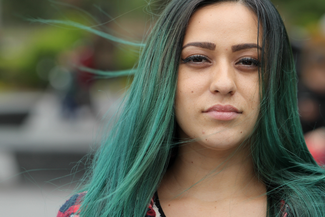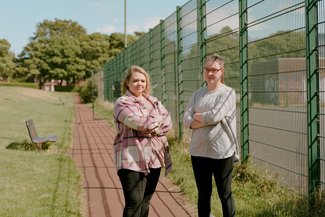
Young Women's Justice Project
Engaging with young women, front-line staff and other experts to build an evidence base about the needs of girls and young women in contact with the criminal justice system.

10 Jan 2024
Our recently published briefing, A Call to Action, focuses on the needs of young women (17-25) in contact with the criminal justice system. It forms part of our Young Women’s Justice Project, making the national case for age-, gender-, culturally, and trauma-responsive specialist services for women of this age group.
In this two-part blog, we explore an example of good practice: Newham's pilot Youth to Adult probation hub, delivered in partnership with Advance, a domestic violence charity with a specialist focus on supporting women in contact with the criminal justice system.
We spoke to a young woman who accessed the hub, Loishana (L), and one of Advance’s keyworkers, Zoe (Z), to hear their thoughts on a gender-responsive approach to probation, and how they connect to the recommendations put forward by A Call to Action.
A Call to Action evidences that, with specialist early interventions and ongoing support, there is the opportunity to end a cycle of harm and change the trajectory of a young woman’s life.
We know that many women arrive to prison due to lack of support around multiple, intersecting needs, such as experience of sexual or domestic abuse, poverty, substance use and mental health needs. This is particularly true for girls and young women, yet they are systematically overlooked in policy and practice.
As part of the Youth to Adult project, Advance provide an age-, gender-, and trauma-responsive approach to young women on probation at their East London women’s centre. Using their Minerva model, they take a holistic view of young women’s needs, offering consistent support through key-workers, groups, and activities in a womens-only safe space.
Young women can attend their probation appointments at the women’s centre and access wrap-around support from Advance for up to 12 to 18 months, meaning keywork support often extends beyond the length of their probation process. The partnership between Advance and Probation means young women can access their probation appointments in a gender-informed environment and receive holistic support from both agencies.
We began by discussing the importance of offering support in a women’s only space. Loishana reflected: “I felt more open with Zoe and my probation officer because it was solely based around women. I feel like if there had been men there, I wouldn’t have been able to open up or confide in them about things.”
Zoe agreed: “If it was a mixed-gender place, it just wouldn’t work, it would make women not feel safe. Especially if you’ve experienced domestic violence and you don’t trust men and then you come into a space to talk about your experiences and a man is sitting opposite you.”
L - “I feel the space really helped… It’s such a calming atmosphere. There were times were I’d be very stressed and I’d come in and … I completely just broke down, and I told her everything. I must have really trusted my emotions with Zoe.
Z – “It shows when you do feel safe around someone, you can let yourself be vulnerable and open to things – it opened up her eyes to what was going on in her life… Then it’s like, ‘Ok, what can we do to help you, what’s our next steps to help you get the best out of this?’”
This trust opened up space for Zoe to help Loishana with other factors in her life, outside of her contact with probation. Zoe was able to offer specialist support, facilitating Loishana to navigate multiple different public services.
A Call to Action highlights the need to break down siloes between services and argues for 'Specialist young women’s outreach workers', who can work intensively with young women while supporting them to navigate services, to be available across the country.

L - “Zoe was always asking me if I needed access to foodbanks. Because she had the links there, she was very helpful. My son was placed with family members because of domestic violence, and Zoe got me an IDVA, she tried to make sure I had somewhere safe to stay. When I confided in her, she helped me with the steps I needed to take in order to make my situation safer for me and my son. I feel like if I didn’t have that, the situation would have got worse. I was going through housing issues at the time, and she was really helpful with that as well.”
That led us to how the Y2A hub differs from the experience of probation for adults, or men and boys:
L – “With my ex-partner, I had been to one of his probation meetings and it was literally just, “Right, you’ve been late, that’s going down as a strike”. It was really black and white. I noticed that there wasn’t a lot of support in place.”
Z – “Loishana has been lucky, since she came into the criminal justice system, she has been in the Youth to Adult hub, so she’s always worked with trauma-informed, female, probation officers. It wasn’t like a generic probation officer which changes every week – she's had the same officer from the beginning to the end. It’s consistent, communications open, and they know exactly how to work with young women, rather than a probation officer that might have just had everyone on their caseload, overworked and stressed out.
L - “I feel like when you only have a few cases, it’s better. You can get to know your cases better on a 1:1 level. As the weeks will go on, whoever you’re working with will be more open with you because they get more comfortable with you.”
Our briefing recommends that young women have access to consistent support delivered by specialist workers, who have small caseloads and can work with them over an extended period.
This enables them to develop trusting relationships and conduct intensive supportive work, through understanding young women’s individual needs.

Loishana and Zoe agreed that young women are often dismissed by other professionals:
L - “With young people, I think they think, ‘Oh, she’s young, she doesn’t know what she’s talking about, she doesn’t know the system. I’ve learned that as a young person I need to fight ten times harder, because they have that narrative that I don’t know what I’m talking about or I’m not experienced enough.”
This can lead to serious failures to safeguard, said Zoe: “They don’t take young women’s needs seriously – it's like, why do you always wait until we’re in a crisis? Why wait so long when they’re asking for help usually right at the beginning.”

Engaging with young women, front-line staff and other experts to build an evidence base about the needs of girls and young women in contact with the criminal justice system.

A new briefing paper published today by Agenda Alliance and Alliance for Youth Justice (AYJ) reveals the severe mental health problems facing young women in our prisons.

As part of our Young Women's Justice Project, we recently spoke to two young women with lived experience of the criminal justice system, asking them what they think needs to change.